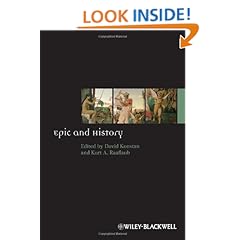
- The first book to gain new insights into the topic of ‘epic and history’ through in-depth cross-cultural comparisons
- Covers epic traditions across the globe and across a wide range of time periods
- Brings together leading specialists in the field, and is edited by two internationally regarded scholars
- An important reference for scholars and students interested in history and literature across a broad range of disciplines
Heroic epics have existed in many cultures, from antiquity to the modern day, offering an important means by which societies commemorate the past and transmit memories over time. Yet few attempts have been made to compare these epics systematically or to establish a typology of heroic epic. Nor is it always clear to what extent heroic epics reflect history, or what methodologies might be used to retrieve historical information from epics.
Addressing these issues, Epic and History invites comparison across a broad variety of cultures in which traditions of epic – oral and written – existed and continue to exist. It makes a unique and conscious effort to take full advantage of this cross-cultural comparison to enhance our understanding of this important topic, presenting crucial insights into how history is treated in narrative poetry.
Contributors are leading scholars on epic and heroic poetic traditions. They base their analyses on profound knowledge of the wide range of cultures discussed throughout the book, from the ancient Near East and South Asia, the Greco-Roman world, and medieval Europe – from Scandinavia to Spain – to today’s Egypt, Southern Africa, and Central America.
Kurt A. Raaflaub is David Herlihy University Professor, and Professor of Classics and History at Brown University. His numerous publications include The Discovery of Freedom in Ancient Greece(2004) and Origins of Democracy in Ancient Greece (2007, co-authored with Josiah Ober and Robert Wallace). He is also the editor of Social Struggles in Archaic Rome (Blackwell, 2005), andWar and Peace in the Ancient World (Blackwell, 2007), and co-editor of Democracy, Empire, and the Arts in Fifth-Century Athens (1998), War and Society in the Ancient and Medieval Worlds(1999), A Companion to Archaic Greece (Wiley-Blackwell, 2009), and Geography and Ethnography: Perspectives of the World in Premodern Societies (Wiley-Blackwell, 2010).
No comments:
Post a Comment